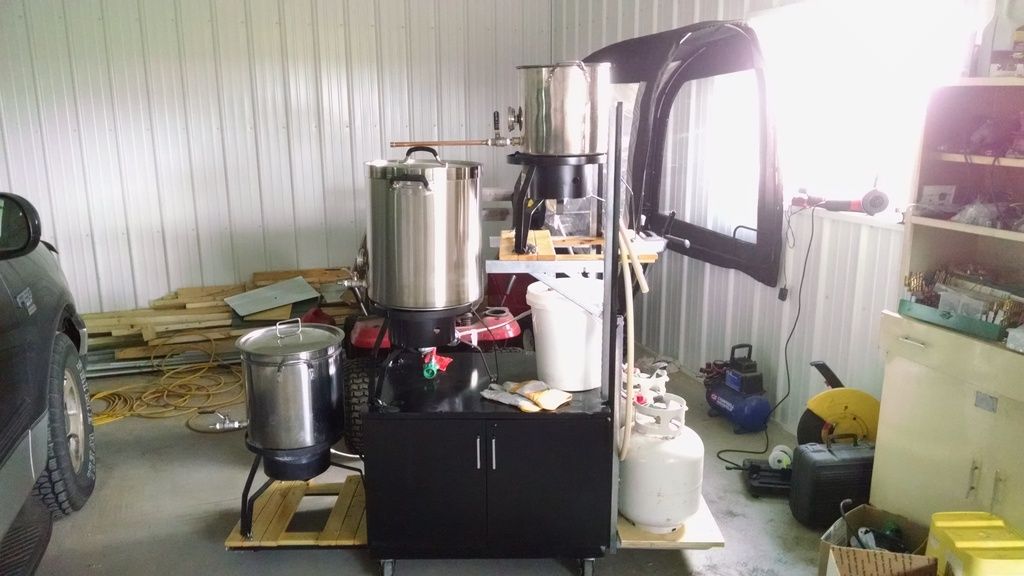Alright, so I've done enough extract to have made some beers that are better than just 'hey, I made beer!' and have done the obvious things to improve quality: OCD sanitation, immersion chiller, yeast starters, pure O2. Now I've jumped to an all grain setup with my old turkey fryer as a HLT with a weldless valve, a 10 gallon igloo with a false bottom as a MLT, and a blinged-out 10 gallon V3 Spike kettle that my lovely wife allowed me to put on the wedding registry. I winged it a bit with my first AG batch, and against all odds made a pretty good milk stout that's as good as anything I've made so far, as far as I can tell from my 'gravity readings' (gravity hasn't changed in a week, I still feel the need to dip the beer thief most days.)
So on my last batch, when I mashed in I didn't hit the temperatures I wanted (150-152 mash for 60 minutes, 170 mashout for 10, then sparge, right?) and ended up needing to keep adding hot water to get up to those temps, which left me with a ton of liquid in the mash, and in turn needed even more added to raise the temp for the last 10 minutes. I topped it up with boiling water, and only got it to 167 or so, at which point I had so much liquid in play in the tun that I didn't really sparge in the sense that I drained it and re-circulated that back on top, but never really 'rinsed' it with additional water. Still, I hit my target gravity, and the boil-off rate of the wider Spike kettle actually brought me down to just about 5.5 gallons in primary. All's well that ends well.
Still, looking at books, various calculators online, youtube videos, and poking around threads on here, I still can't figure out exactly where to start on my brew process this afternoon. I have a 15.25 lb grain bill, and I'm shooting for 6 gallons in the fermenter after a 90 minute boil. Last batch I measured about .7 g/hr boiloff rate, so I think I want 7g in the kettle.
So, here are my specific questions:
How to I calculate how much strike water to hit it with? I see lots of different calculators that all contradict each other.
How do I raise mash temp at the end? Just add boiling water to the existing mash till I measure my target?
How do I calculate how much sparge water I need, and what temp should I sparge at?
Thanks a ton guys. If there's a thread that makes all this clear please just feel free to link to it, I'm sure the info is out there, I just keep coming across partial answers that don't seem to fit with other parts of the equation.
So on my last batch, when I mashed in I didn't hit the temperatures I wanted (150-152 mash for 60 minutes, 170 mashout for 10, then sparge, right?) and ended up needing to keep adding hot water to get up to those temps, which left me with a ton of liquid in the mash, and in turn needed even more added to raise the temp for the last 10 minutes. I topped it up with boiling water, and only got it to 167 or so, at which point I had so much liquid in play in the tun that I didn't really sparge in the sense that I drained it and re-circulated that back on top, but never really 'rinsed' it with additional water. Still, I hit my target gravity, and the boil-off rate of the wider Spike kettle actually brought me down to just about 5.5 gallons in primary. All's well that ends well.
Still, looking at books, various calculators online, youtube videos, and poking around threads on here, I still can't figure out exactly where to start on my brew process this afternoon. I have a 15.25 lb grain bill, and I'm shooting for 6 gallons in the fermenter after a 90 minute boil. Last batch I measured about .7 g/hr boiloff rate, so I think I want 7g in the kettle.
So, here are my specific questions:
How to I calculate how much strike water to hit it with? I see lots of different calculators that all contradict each other.
How do I raise mash temp at the end? Just add boiling water to the existing mash till I measure my target?
How do I calculate how much sparge water I need, and what temp should I sparge at?
Thanks a ton guys. If there's a thread that makes all this clear please just feel free to link to it, I'm sure the info is out there, I just keep coming across partial answers that don't seem to fit with other parts of the equation.



